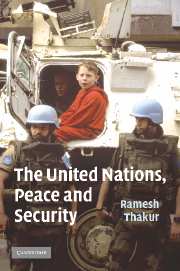Book contents
- Frontmatter
- Contents
- List of figures
- List of tables
- Foreword, Gareth Evans
- Acknowledgements
- Introduction
- PART I An international organisation for keeping the peace
- PART II Soft security perspectives
- PART III Hard security issues
- 7 The nuclear threat
- 8 International terrorism
- 9 Kosovo 1999
- 10 Iraq's challenge to world order
- 11 The responsibility to protect
- 12 Developing countries and the eroding non-intervention norm
- PART IV Institutional developments
- Conclusion: at the crossroads of ideals and reality
- Index
12 - Developing countries and the eroding non-intervention norm
Published online by Cambridge University Press: 24 May 2010
- Frontmatter
- Contents
- List of figures
- List of tables
- Foreword, Gareth Evans
- Acknowledgements
- Introduction
- PART I An international organisation for keeping the peace
- PART II Soft security perspectives
- PART III Hard security issues
- 7 The nuclear threat
- 8 International terrorism
- 9 Kosovo 1999
- 10 Iraq's challenge to world order
- 11 The responsibility to protect
- 12 Developing countries and the eroding non-intervention norm
- PART IV Institutional developments
- Conclusion: at the crossroads of ideals and reality
- Index
Summary
General Bonaparte, following the footsteps of Alexander would have entered India not as a devastating conqueror … but as a liberator. He would have expelled the English forever from India so that not one of them would have remained and … would have restored independence, peace, and happiness to Asia, Europe, and to the whole world … All the Princes in India were longing for French intervention.
There is an evident divide between the global North and South. The Non-aligned Movement – with 113 members, the most representative group of countries outside the United Nations itself – three times rejected ‘the so-called “right of humanitarian intervention” ’ after the Kosovo War in 1999 and the subsequent statements from UN Secretary-General Kofi Annan. Many developing countries assert a claim to the privilege of managing world order on a shared basis but exhibit a strong reluctance to accept the responsibility flowing from such privilege, for example with respect to protecting the victims of humanitarian atrocities. Some of the big and powerful countries insist on claiming the benefits flowing from collective decision-making, in the form of greater legitimacy and authority, but resist the constraints on policy options that would result from a genuinely shared process of international policy-making. Curiously, the two feed on each other. The South points to the North's monopoly of power and privilege to excuse its own lack of a sense of international responsibility; the North points to the many instances of the South's failure to honour the international responsibility to protect to justify its refusal to restrict international policy-making to the collective UN forum.
- Type
- Chapter
- Information
- The United Nations, Peace and SecurityFrom Collective Security to the Responsibility to Protect, pp. 264 - 288Publisher: Cambridge University PressPrint publication year: 2006
- 1
- Cited by



